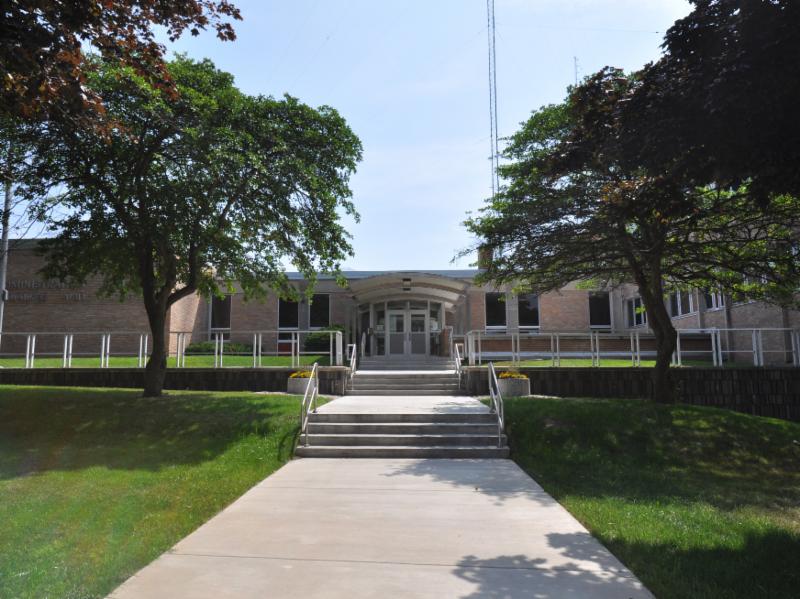MPS Embroiled in a Real Food Fight
Student group protests quality of school lunches. School board considers changes.

Milwaukee Public Schools Office of School Administration, 5225 W. Vliet St. Photo courtesy of Milwaukee Public Schools.
Some Milwaukee Public Schools (MPS) students contend that the district’s food is not only poorly prepared but sometimes inedible. Others, including Muslim students and those of other faiths, as well as those with dietary restrictions, say the MPS production kitchens leave them few choices, and often they go hungry. That was the message they brought to a MPS school board committee meeting last month..
School board directors Henry Leonard and Erika Siemsen sponsored a resolution calling for the establishment of a food justice task force to examine the problem and develop workable solutions. At the committee meeting, 16 individuals spoke in favor of this resolution.
“I don’t know how [many] realize how much food is being thrown out every day,” said teacher Michele Hilbert. The prepackaged food coming from the centralized kitchens was inconsistent, she said. “Sometimes it is burnt or still frozen.
Former MPS teacher and now county supervisor and state Rep. Ryan Clancy, along with fellow supervisor Juan Miguel Martinez, issued a press release declaring their solidarity with a student group that has called for higher quality lunches. At the committee meeting Clancy said he saw the quality of the food drop when MPS went to centralized kitchens. As a result, he said, some students replaced school lunches with junk food. Clancy also said he saw a change in student behavior directly related to a change in eating habits.
Students who could not eat the meat meals were often offered peanut butter-and-jelly sandwiches. When they brought their concerns to the MPS nutrition department, the students told the committee, they felt they were not treated seriously.
In an April 12, 2022, letter to the students and their advisors, Omer Abdullah, director of school nutrition, stated, “While schools are not required to provide accommodations for religious dietary restrictions in school lunches, we do attempt to provide alternative entrees for students seeking other choices.”
Students complained that this often meant a cold sandwich and a salad, not the hot meal offered to other students. Abdullah said in the letter that MPS hoped to offer alternatives such as “entrée-style salads or falafel and hummus wraps.” The students said they were still waiting. One issue is that students who don’t like the day’s meal are free to choose an alternative meal, and that may exhaust the supply of alternative meals so that those with religious dietary restrictions might be left with no choice if they come later to the lunch line.
Most students speaking at the committee were from the student group, Youth Empowered in the Struggle (YES) that have been fighting this issue since last April, as a story by the Wisconsin Examiner reported. YES is the student arm of Voces de la Frontera, an organization known mostly for defending immigrant and workers’ rights in the Milwaukee area.
Speaking at the committee meeting was Hamilton high school teacher, John Fleissner, who said in an interview with Urban Milwaukee that he has been working as an advisor with YES for a decade. “I teach students how to organize,” he noted. Fleissner said that YES students were deciding what was the next project to take on, and after surveying 2,000 students, they found the top issue was school lunch.
At the committee meeting the students highlighted a You Tube video from Al Jazeera, What’s WRONG with school lunch in the U.S.?, which contrasted the poor quality and food choices at MPS with a model operation in Minneapolis schools. The video included an interview with Jennifer Gaddis from UW-Madison and author of the book, The Labor of Lunch, who talked about how school lunches can be healthier and better prepared.
Last spring, YES students organized a conference at Hamilton with a number of elected officials, met with MPS administration, and got Leonard and Siemsen to sponsor a resolution calling for a task force to address the problem. The resolution passed the committee and ultimately the full board.
The school administration states that the problems with school lunches are directly related to the pandemic, supply chain issues and a food worker shortage.
School board president Bob Peterson expressed sympathy for the frontline workers who struggle to provide school meals. He stated he had spent time at a couple of kitchens. “I learned a lot, what it takes to create four, eight, ten thousand meals a day.”
In 2010, then-superintendent Gregory Thornton proposed moving from a full kitchen in nearly every school to centralized kitchens that would process and ship lunches to schools throughout the district. It would save money. He recommended contracting with an outside company to run the operation. That proposal failed before the board.
Two years later he proposed centralized kitchens using MPS employees. That proposal passed. (Full disclosure: I was on the school board at the time and voted against the 2010 proposal but for the 2012 alternative.)
MPS believed that it could maintain the quality of food service even through the use of centralized kitchens. But current superintendent Keith Posley seems to be reconsidering this. At the board’s January 24 budget meeting, the administration stated that two of its 13 budget goals for the coming year would be increasing the number of site-based production kitchens and replacing aging kitchen equipment.
Perhaps the district won’t be able to go back to a kitchen in every school, but it could rely more on fresh produce and less on food from commercial providers. In the Al Jazeera video, the director of food service in Minneapolis, Bertrand Weber, states that cooking from scratch is no more expensive than buying processed food. Schools must pay workers more, but the food costs are less. And those jobs can be attractive, Weber noted: “Not too many restaurants are going to offer [a food service employee] a retirement plan.”
At the encouragement of Peterson, Leonard and Siemsen have examined food operations at Parkside elementary and another school. The resolution calls for the task force to present its first report in March 2023, followed by bimonthly reports through January 2024 and biannual reports through January 2026. It remains to be seen how much this will change the MPS school lunches.
Political Contributions Tracker
Displaying political contributions between people mentioned in this story. Learn more.
- August 26, 2018 - Bob Peterson received $20 from Erika Siemsen
K-12 Education
-
The Unknown MPS Office
 Jun 26th, 2024 by Terry Falk
Jun 26th, 2024 by Terry Falk
-
Who Is Eduardo Galvan?
 Jun 19th, 2024 by Terry Falk
Jun 19th, 2024 by Terry Falk
-
How Will School Board Hire New Superintendent?
 Jun 10th, 2024 by Terry Falk
Jun 10th, 2024 by Terry Falk






















I was just wondering if the students dont like the food at the schools is a possible solution just packing their own lunches so they are able to eat what they want? Why is this not mentioned in the article?
Students need fresh food prepared on site for lunch.
Food is wasted because it is packaged off site
Staff can make hot entree chicken ground beef etc
Bread and frozen vegetable
This would also give job security to dietary staff
Sup Posey should go into the schools and look at the quality of food served .
correctional clients are served more appealing food
Why is it so difficult for systems to move on?